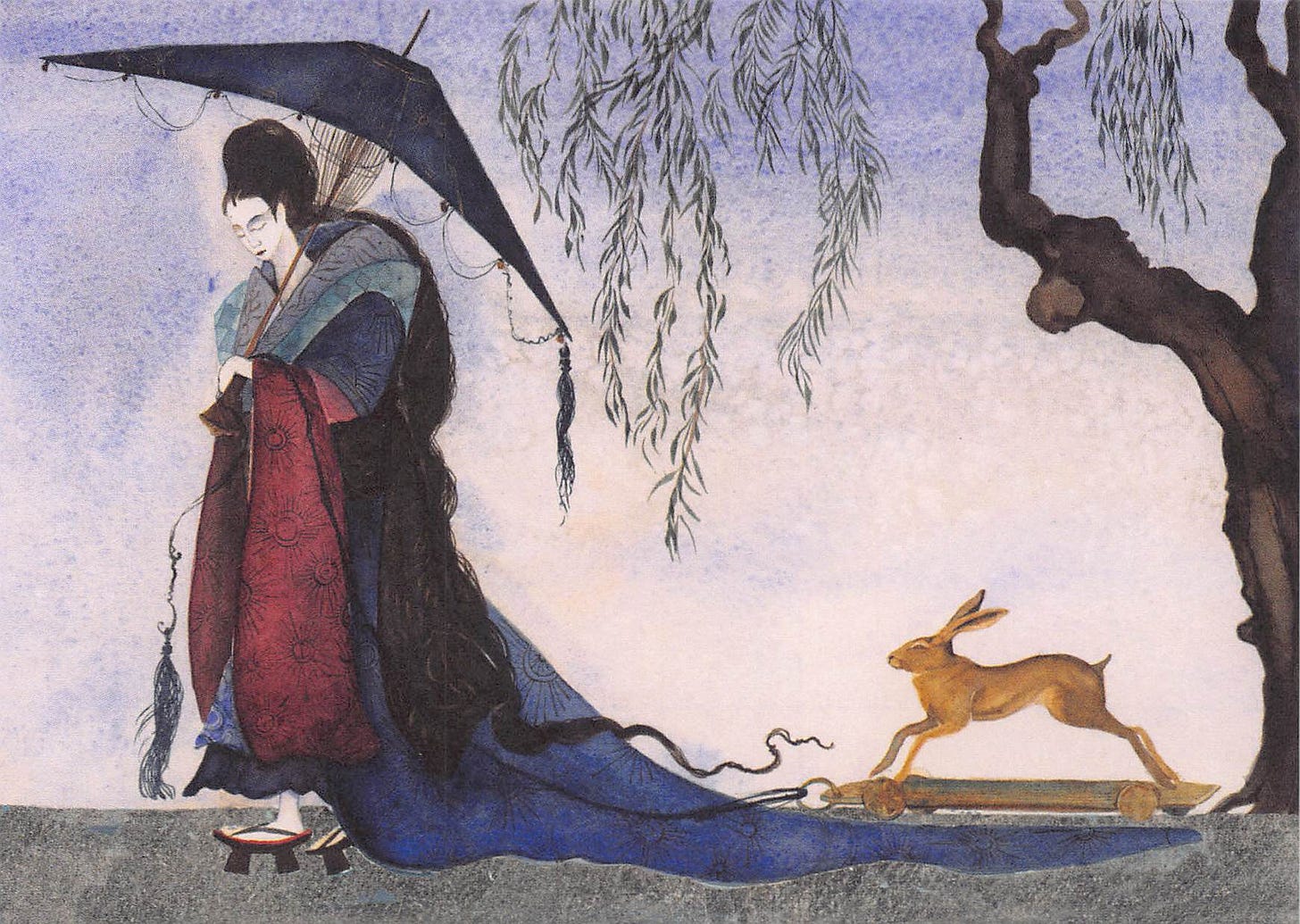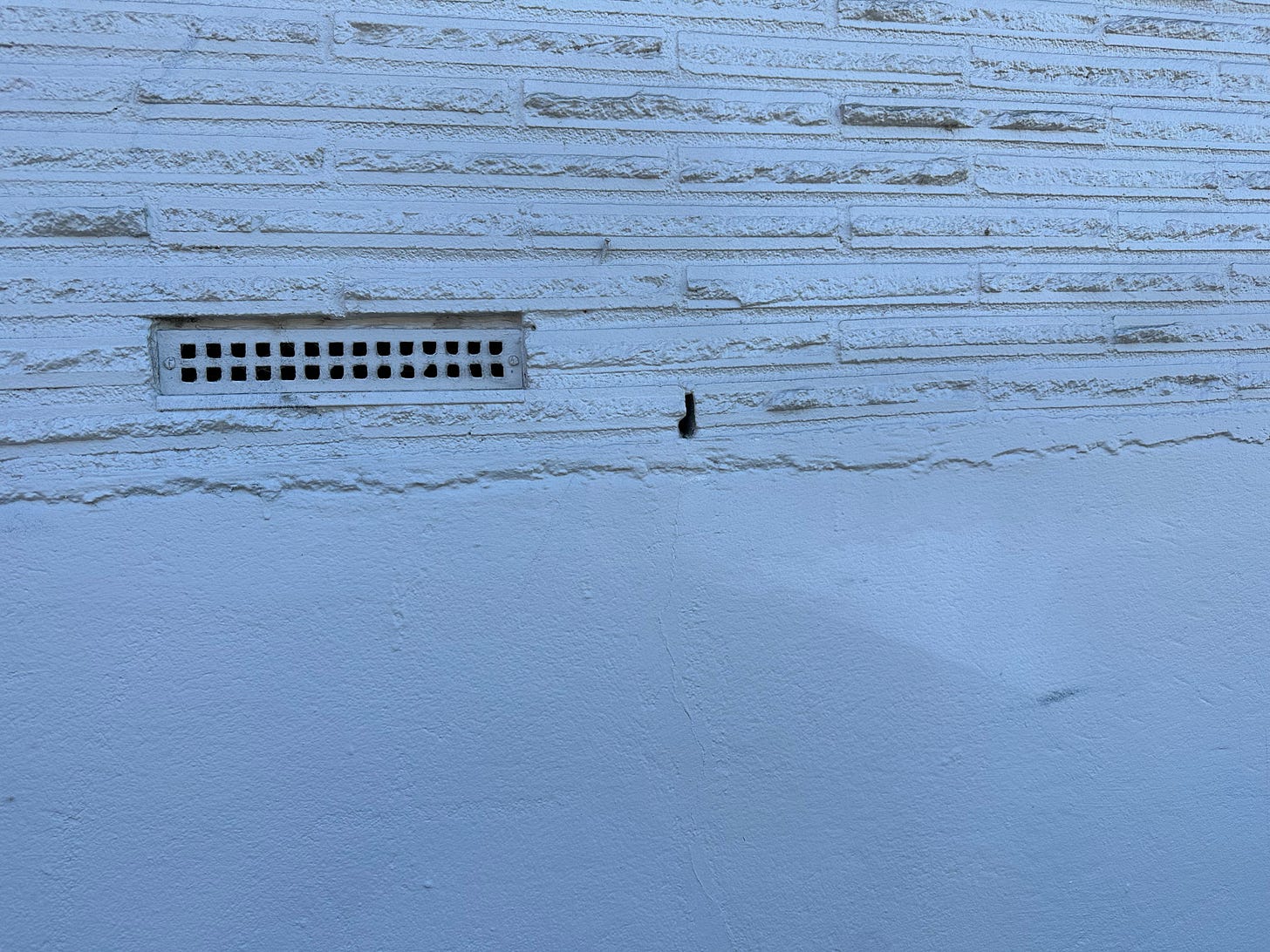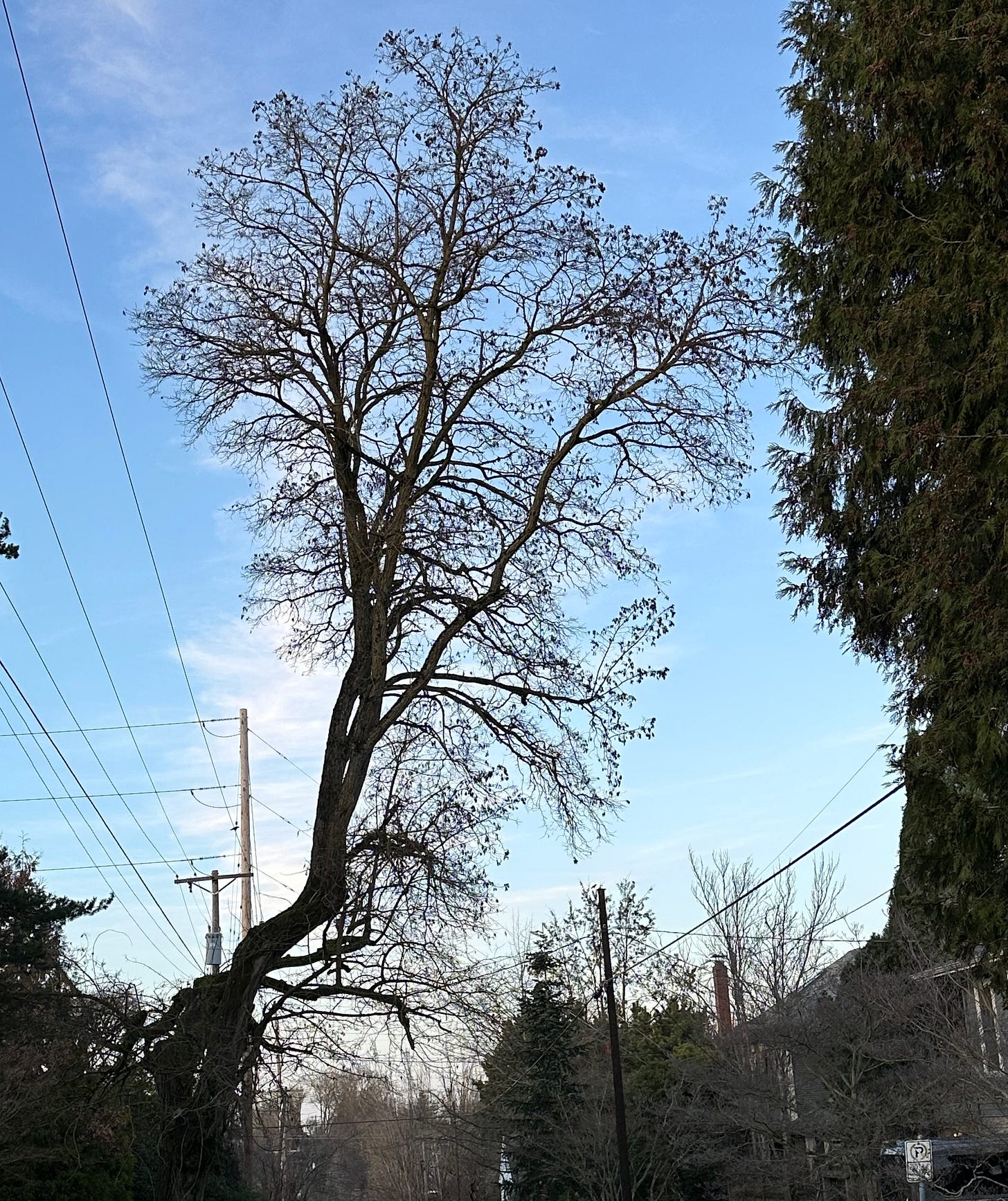Check in
How Becoming works
Thanks to the publication of an article* I wrote about Portland street addresses on OregonLive (the online presence of The Oregonian), I have acquired many new subscribers. For them and for my intrepid weekly followers, here is a brief description of how Becoming works:
Every week, I pull together a compendium of thoughts and photos, poems and observations. I arrange them carefully, with plenty of subheads and art to break up the monotony of gray type.
Your time is limited and you have many things to read, from good old books, to news sites, to cereal boxes, to other Substack entries. I try to make it easy for you to pick what is most interesting to you. If you don’t care for an item, just scroll past it. Some other shiny thing will catch your eye.
Every few months, I revisit the Becoming mission statement. It’s overtly about creating, but it also applies to how we live our lives:
Take time, feel gratitude, forgive.
Remember what matters: Spirit, authenticity, justice, words.
Let the work come. Don’t force it.
Wait, and inspiration will come sooner than you think.
Let your little story come out and play.
I love writing Becoming. I am continually surprised that new ideas batter their way into my knowing each week (I publish on Saturday evening). Some of my loyal readers say they find what I write to be relaxing or uplifting. One of them memorably told me it lowers his blood pressure. Thank you, Jeff!
*The OregonLive feature is a subscriber-only article. To read the Substack posting I based it on, find “Ghost Stories” in my archive.
Background
Who am I, and where do I come from?
I recently changed my Substack profile, which had included some staid wordage about my prior life, when I was a copy editor and sometimes reporter for The Oregonian.
My new profile:
Fran Gardner curates a sock drawer of ideas that don’t match. She salts them with photos and poems. Nothing is what you’d expect.
The farther behind I leave my 34-year career at the paper (I left in 2008), the less it seems to matter. I am who I am now.
What is real
When people ask where I’m from, I sometimes say Portland (where I’ve lived since 1974), sometimes Minnesota (where I grew up). This helps to give them people an idea of what my experiences have been.
But background is also a deeper place, where our darkest motives live, where our essences are formed.
Think a bit about your background, the inner you. Maybe you would like to write about it, or knit the memories it engenders into a scarf, or consider its contours while you are chopping garlic.
I channeled my thinking into a poem.
Background
I have a background, as in where I’m from Minnesota or Oregon, take your pick. But the background of my life is elsewhere. Internal, eternal, unknown and knowing. Part of it’s gemstones of fire: Diamonds on black cloth, shooting flames. Rubies, I fancy, maybe garnets, Or fire opals, chameleon stones. Fire beneath my skin, a background For all my corpuscles arrayed. Deep, deep within there are flames While outside, an alabaster fort.
Winter blue
This restful photo is of a wall on Southeast Salmon Street in Portland. It reminds me of the “alabaster fort” in the poem.
Generosity
We’ve just made it through a season of gift-giving. We are generous in the holiday season, remembering our loved ones and, often, writing year-end checks to charities, churches and other organizations we support.
The acknowledgement letters we receive in return always refer to our “generous support” even when we only donated five bucks.
Make it bigger
This year, 2025, why not ratchet up generosity. Instead of waiting for the end of the year and figuring how much is “left over” to give away, come up with a figure now and make donations for the year at its outset.
How to set that figure? It could start with a tithe—10 percent of income, however you want to define what income is.
However you do it, settle on a figure to donate. Divide it among the organizations you favor and the spiritual institutions that nourish you. Write those checks now, from the first fruits.
It seems a mean thing to wait till December, calculate what’s left, and donate to charity then. Rather, start fresh, off the top of the year. Share your abundance.
What we notice
This maple tree is only a block from my house. And yet, I’ve never noticed its off-center grace. Summer’s leaves obscure its sweet form, for one thing. Over time, utility crews trimmed it away from the wires.
Poem out of nowhere
Sometime a poem comes to me while I’m doing something else, such as working on my daily writing exercise. Like most of them, this one wrote itself. That doesn’t mean I didn’t work on it, revise it, but that its bones were laid out for me. I had merely to clothe them.
A gift
Prayer eluded me, and then it came, A fragile gift, not to be ignored. Praying for sustenance, peace and forgiving, Praying for others, their best selves restored. When did I lose it, the power to pray? Tired of pleading and sick of the world. What could prayer matter in this willful cosmos, Full of dark visions, of serpents uncurled? All of the people I know I could pray for People of sorrow yet joyful and bold— These are my equals in living and striving For them, for me, prayer brings us back to the fold.
Postcards
I just bought some postcard stamps from USPS. They cost—gasp!—56 cents apiece. Truly, I remember when it cost 2 cents to mail a postcard. (Robert remembers when you could plunk a nickel into the turnstile to ride wherever you wanted to go on the NYC subway.)
Long ago, you could also buy blank postcards with postage printed right on them from the post office. Today, the USPS offers three sets of oversized postcards. Stamps are included but not attached.
Hardly anyone sends postcards these days, but one of my daughters gave me a couple of collections of postcards that I am delighted to use. Give me your address and I’ll send you one. At least the postcard stamps I just ordered will be good even if rates rise again. They are what the Postal Service calls “forever stamps.”
Penny postage. Those were the days.

Pennies in your pocket
Remember the days before digital wallets, when coins were everywhere? People even kept a stash in the car for things like parking meters and tolls.
And of course, the coins weighed down pockets.*
Pocket change
A quarter for the meter, 10 cents for the phone. Remember coffee used to cost a dime. A nickel for the paper, perhaps a candy bar, Bell-ringing Santas asked for coins in pails. At night, splayed on the dresser. Even then, pennies were a pain. The bank would take them in a roll— 50 hand-packed in a paper tube. You’d find coins in your sofa, Fugitives from pockets, Now pockets* hold our phones And we pay with electrons.
*Unless you’re a woman. Good luck finding pants with pockets that aren’t jeans. But … we girls have purses.
Some banks still accept rolled coins, although my bank is not among them.
Here’s a link to a video on how to do get the coins into those small paper sleeves.
Banks may also have coin-counting machines that don’t take a cut like the ones at the supermarket do.
And one final factoid about postcards. I’m beholden to the Postal Service for pointing out the fancy word for postcard-collecting is “deltiology.” Wondering where this word comes from? Deltos (Δέλτοs) is Greek for a small writing tablet, and of course “ology” means “study of.”
Even spell check recognizes the word deltiology, changing it for me after I typed it incorrectly.
Seasonal scent memory
Out and about in my wheelchair, I’m assaulted with a strong scent of pine resin. Although it’s January already, this scent transports me back to Christmas.
I haven’t had a Christmas tree since maybe 1998. Once the kids were gone, it never seemed worth the effort and mess. I do miss the scent, though—a major reason I’ve never considered an artificial tree.
And now, next to me on the road, a large truck filled with discarded Christmas trees—in Oregon, undoubtedly mostly firs, not pines. The truck’s bounty scents the entire neighborhood.
This smell kicks in memories of a life lived long ago. Sights and sounds: Carols, ornaments, cookies, crackling wrapping paper, rapturous cries of “Just what I wanted!” The smell of candle wax. Ribbons dangled for the cat to play with.
And besides the spicy scents of the season, the sweet sharpness of citrus. There were always nuts and clementines (we called them mandarin oranges then) stuffed into the toes of our stockings.
Checkout
Deadlines
I get up every weekday morning to spend two hours (6-8 am) with about a dozen other writers on a Zoom call.* We turn off our cameras and write. The energy is palpable, and those hours are usually—I could say always—productive.
Recently, some participants were complaining about deadline pressure and how it can dampen creativity.
I had a career where deadlines mattered, so I’m used to them. Deadlines keep me on track. Like, 7 pm Saturday, publish another issue of Becoming.
That’s a positive deadline, but the ones to beware of are the artificial ones. You know, the ones you set with no hope of fulfilling. Like when I tell myself I’m going to have a book proposal ready in two weeks. No clue how to make that happen.
*Worm Zoom is hosted by Mason Currey for paid subscribers to his Substack. He’s published two books, Daily Rituals: How Artists Work and Daily Rituals: Women at Work, and is working on another. Those books are fun to read!
New post
Half a dozen crew members from PGE turned up last week to install a new power pole outside our house on Main Street. They reattached wires so carefully that our electricity was never interrupted.
They cut off the top of the old, insect-infested pole but left the stub with some wiring still attached to it. I’m assuming they’ll come back later to finish the job.
—30—
If you think others would like this newsletter, hit re-stack (the interlocking arrows at the top of this item) or share.
Please consider supporting my writing financially. On PayPal, you can tip me in $5 increments. Or use the button below to buy a monthly or yearly subscription.
You can subscribe to Becoming for free and read everything I write. As the saying goes, why keep a cow when you can buy milk? Still, I’m suggesting you help support my efforts by investing in the cow. You can do that for less than $1 a week.







As usual, Fran, your post is filled with delightful bits that I want to comment on. This time, I made a list.
I loved your poem about backgrounds, especially the lines "deep, deep inside, there are flames / while inside, an alabaster fort." So true that we keep our fires subdued within the stone walls. They're too bright to others' eyes.
Generosity inspired thoughts around donations of hand-made things to organizations without getting any notice of their affect. For years, I've enjoyed knitting caps for cancer patients and lap blankets for nursing home clients. I will never know if they were well-received or not, but it doesn't matter. I enjoyed the designing of them and the women in the shawl ministry I met with once a month.
Watching that man try to load coins in that tube made me squeal. I used to wrap tons of quarters from our vending machines, lining them up in the ditch of two fingers and slipping that tube over them with no problem. Slick as a whistle! Also, our bank does have a counting machine in the entrance, but it's often broken down. Screws, bullet casings, and thumb tacks don't go down well, apparently.
My husband commuted five hours away for work and knew he was getting close to home in the mountains when he could smell the "butterscotch" aroma of the ponderosas.
This is too long a comment, but I couldn't resist telling you how your posts affect me every week. Thank you, Fran.
Thanks for the shout-out, Fran! Glad to have you in Worm Zoom.